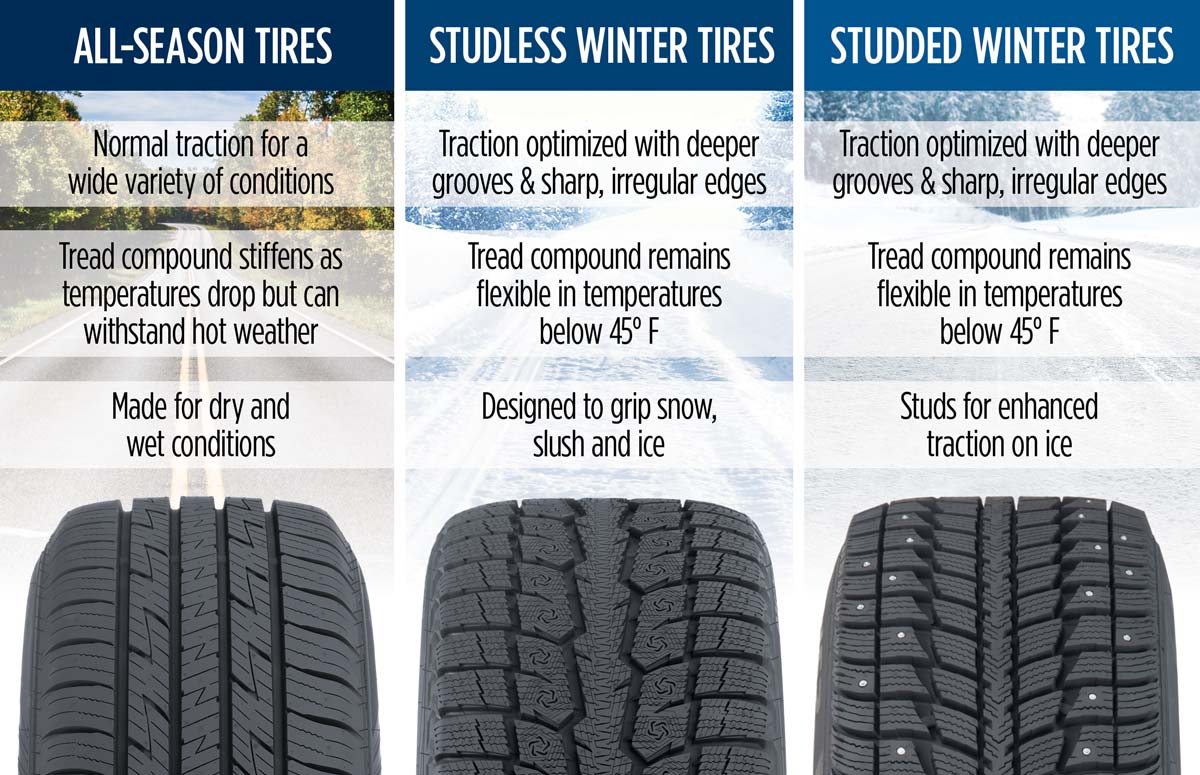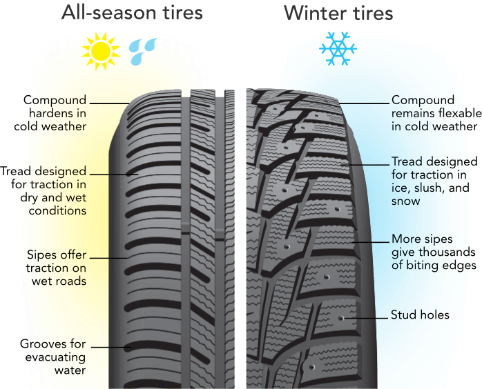Looking for the best all-season tires for snowy conditions? Well, you’re in luck!
When it comes to staying safe and secure on winter roads, having the right tires is crucial.
But with so many options out there, how do you know which ones are the best for tackling snowy conditions?
In this article, we’ll explore the top contenders for the title of the best all-season tires for snowy conditions. So, buckle up and let’s dive in!

Source: lesschwab.com
Best All-Season Tires for Snowy Conditions: A Comprehensive Guide
When it comes to driving in snowy conditions, having the right tires is crucial for safety and performance. All-season tires are an excellent choice for year-round driving, but not all of them are optimized for snowy conditions. In this comprehensive guide, we will explore the best all-season tires specifically designed to tackle snowy roads. Whether you live in an area with heavy snowfall or frequently travel to snowy destinations, these tires will ensure you have the traction and control you need to navigate through winter weather with confidence.
What Makes a Tire Ideal for Snowy Conditions?
Before diving into the top recommendations, it’s important to understand what sets certain tires apart for snowy conditions. The following factors should be considered when evaluating all-season tires for snowy conditions: tread pattern, rubber compound, siping, traction technology, and winter performance ratings.
Tread Pattern
The tread pattern of a tire plays a crucial role in handling snowy conditions. Look for tires with a specific winter tread pattern that features deep grooves and sipes. These grooves help channel snow and slush away from the tire’s contact patch, allowing for better grip and traction on slippery surfaces.
Additionally, some all-season tires incorporate unique features like multi-directional sipes or zigzag patterns, which enhance both snow and wet performance. These specialized tread patterns optimize traction, reduce hydroplaning, and ensure stability in a variety of winter conditions.
It’s also worth considering tires with self-cleaning tread patterns that prevent snow buildup, as this can significantly affect traction and handling.
Rubber Compound
The rubber compound of a tire can greatly impact its performance in winter conditions. Look for all-season tires that are specifically formulated with a cold-weather compound. These compounds remain flexible even in freezing temperatures, allowing for better grip on snowy and icy roads. Additionally, cold-weather compounds provide enhanced braking and handling capabilities in cold conditions.
Some manufacturers also incorporate special additives into their rubber compounds, such as silica or other high-tech materials. These additives further enhance the tire’s performance by improving traction, reducing rolling resistance, and offering a longer service life.
Overall, choosing all-season tires with the right rubber compound is essential for maintaining optimal grip and performance in snowy conditions.
Siping
Siping refers to the small slits or cuts in the tire’s tread blocks. These thin cuts allow the tire to deform and create biting edges, enhancing traction on icy and snowy surfaces. The more sipes a tire has, the better its ability to bite into the snow and provide stability during acceleration, braking, and cornering.
High-quality all-season tires designed for snowy conditions often feature complex siping patterns that maximize the number of biting edges. This results in increased grip on slippery surfaces, allowing for better control and handling.
Some manufacturers also include technologies like “micro-sipes” or 3D siping, which provide additional cutting edges for improved winter performance.
Winter Performance Ratings
All-season tires designed for snowy conditions are typically tested and assigned winter performance ratings. These ratings provide valuable information about a tire’s ability to handle various winter conditions, including snow traction, ice traction, and overall winter performance.
Look for tires with high winter performance ratings, as these indicate that the tire has been extensively tested and proven to perform well in challenging winter conditions. Ratings can range from “Severe Snow Service” (identified by the three-peak mountain snowflake symbol) to specific grades for snow and ice traction. Understanding these ratings can help you make an informed decision when selecting the best all-season tires for snowy conditions.
Top Recommendations: Best All-Season Tires for Snowy Conditions
1. Michelin CrossClimate 2
The Michelin CrossClimate 2 is a stellar choice for individuals seeking all-season tires that excel in snowy conditions. This tire features an innovative rubber compound and an impressive tread pattern that provides excellent grip on snow and ice. With its 3D siping and V-shaped tread blocks, the CrossClimate 2 offers enhanced traction and stability, allowing for confident driving in winter weather. Additionally, this tire boasts high winter performance ratings, making it a top contender for snowy conditions.
Benefits:
- Outstanding snow and ice traction
- Excellent wet and dry performance
- Long tread life
2. Goodyear Assurance WeatherReady
The Goodyear Assurance WeatherReady is another top pick for all-season tires suitable for snowy conditions. This tire features a specialized snow tread compound and wide circumferential grooves, improving traction and handling in snowy and icy conditions. It also incorporates Goodyear’s 3D TredLock technology, which enhances biting edges and provides additional grip on slippery surfaces. With its high winter performance rating, the Assurance WeatherReady is a reliable choice for winter driving.
Benefits:
- Strong snow and ice traction
- Responsive handling
- Quiet and comfortable ride
3. Continental ExtremeContact DWS06
The Continental ExtremeContact DWS06 is a well-regarded all-season tire that offers excellent performance in snowy conditions. It features Continental’s unique tread design with numerous sipes and grooves, ensuring optimal grip on snow and ice. The tire’s tread compound provides enhanced traction in cold temperatures, making it an ideal choice for winter driving. Furthermore, the ExtremeContact DWS06 offers impressive wet and dry performance, making it a versatile option for year-round use.
Benefits:
- Competent snow and ice traction
- Responsive handling and braking
- Strong wet and dry performance
4. Pirelli Cinturato P7 All Season Plus
The Pirelli Cinturato P7 All Season Plus is a high-quality all-season tire that delivers reliable performance in snowy conditions. It features an advanced silica compound and an optimized tread pattern that enhances grip and traction on snowy and icy roads. The tire’s interlocking sipes promote stability and control, while its longitudinal and lateral grooves provide effective water evacuation to reduce the risk of aquaplaning. With its durable construction and winter capabilities, the Cinturato P7 All Season Plus is a top choice for all-season driving in snowy conditions.
Benefits:
- Good snow and ice traction
- Low rolling resistance
- Highly comfortable ride
5. Bridgestone Weather Control A005
The Bridgestone Weather Control A005 is an all-season tire that excels in snowy conditions. With its advanced compound and unique tread pattern, the A005 offers excellent traction and grip on icy and snowy surfaces. The tire’s biting edges ensure reliable handling and stability, while its wide circumferential grooves effectively evacuate water and snow. Additionally, the Weather Control A005 boasts high winter performance ratings, making it a reliable and safe choice for winter driving.
Benefits:
- Strong snow and ice traction
- Responsive handling and braking
- Excellent wet performance
6. Yokohama AVID Ascend GT
The Yokohama AVID Ascend GT is a solid choice for individuals seeking all-season tires optimized for snowy conditions. This tire features an advanced rubber compound and an asymmetric tread pattern that enhances grip and traction on snow-covered roads. Its wide grooves effectively evacuate slush and water, reducing the risk of hydroplaning. With its dependable winter performance and long-lasting tread life, the AVID Ascend GT offers peace of mind and reliability in winter driving.
Benefits:
- Good snow traction
- Long-lasting tread life
- Comfortable and quiet ride
7. Falken Wildpeak A/T3W
While most of the tires mentioned so far are designed primarily for passenger cars and SUVs, the Falken Wildpeak A/T3W caters to those who drive trucks and SUVs in snowy conditions. This all-terrain tire offers impressive snow and ice traction, thanks to its aggressive tread pattern and robust construction. The Wildpeak A/T3W is also equipped with 3D Canyon sipes, ensuring optimal grip on slippery surfaces. Whether you’re venturing off-road or navigating through snowy city streets, the Wildpeak A/T3W is a reliable choice.
Benefits:
- Strong snow and ice traction
- Durable and robust construction
- Versatile for off-road and on-road use
Tips for Choosing the Right All-Season Tires for Snowy Conditions
Choosing the best all-season tires for snowy conditions can be overwhelming with the numerous options available. Consider the following tips to ensure you make an informed decision:
1. Understand Your Driving Needs
Assess your driving habits and needs to determine the most suitable tires for your vehicle. Consider factors such as the amount of snowfall in your area, frequency of winter driving, and the type of roads you traverse.
2. Check Winter Performance Ratings
Pay attention to the winter performance ratings of the tires you’re considering. Look for high ratings in snow traction, ice traction, and overall winter performance, as this indicates their suitability for snowy conditions.
3. Read Reviews and Comparisons
Before making a final decision, read reviews and comparisons from reputable sources. This can provide valuable insights from other drivers who have used the tires in snowy conditions.
4. Consult with a Trusted Tire Dealer
If you’re unsure about the best all-season tires for your specific vehicle and driving needs, consult with a trusted tire dealer. They can offer expert advice and help you find the right tires for snowy conditions.
5. Regular Maintenance and Inspections
Once you’ve chosen the best all-season tires for snowy conditions, ensure you follow proper maintenance and inspection guidelines. This includes regular tire rotations, proper tire inflation, and checking the tread depth to ensure optimal performance.
The Importance of All-Season Tires for Snowy Conditions
Investing in high-quality all-season tires specifically designed for snowy conditions is essential for ensuring your safety, as well as the safety of others on the road. These tires provide the necessary traction, control, and peace of mind when driving in winter weather. They are engineered to handle a wide range of conditions, from light snow to heavy storms, allowing you to confidently navigate through whatever winter throws your way. Whether you’re commuting, running errands, or embarking on a winter adventure, having the best all-season tires for snowy conditions is a wise investment that can make all the difference in your driving experience.
Conclusion
When it comes to driving in snowy conditions, having the right tires can make all the difference in your safety and performance on the road. By choosing one of the top-rated all-season tires for snowy conditions, such as the Michelin CrossClimate 2, Goodyear Assurance WeatherReady, or Continental ExtremeContact DWS06, you can ensure optimal traction and control in winter weather. Remember to consider factors like tread pattern, rubber compound, siping, traction technology, and winter performance ratings when evaluating all-season tires for snowy conditions. Lastly, follow our tips for selecting the right tires and prioritize regular maintenance to maximize their lifespan and performance. Stay safe and confident on snowy roads with the best all-season tires for snowy conditions.
Key Takeaways – Best all-season tires for snowy conditions
- Investing in all-season tires designed specifically for snowy conditions can provide safer driving experiences.
- Tires with a high-quality rubber compound and specialized tread patterns are essential for enhanced traction on snow-covered roads.
- Features like sipes and grooves help improve grip on slippery surfaces, allowing for better control and shorter braking distances.
- Opting for tires with the three-peak mountain snowflake symbol ensures they meet strict winter performance standards.
- Regular maintenance, including proper tire inflation and rotation, is crucial for maximizing the lifespan and effectiveness of all-season tires.
Frequently Asked Questions
Are you trying to find the best all-season tires for snowy conditions? Look no further! We’ve compiled some common questions to help you make an informed decision.
1. What are the key features to look for in all-season tires for snowy conditions?
When selecting all-season tires for snowy conditions, there are a few key features to consider. Firstly, look for tires that have the mountain snowflake symbol, which indicates they have passed winter traction performance tests. Additionally, find tires with a high number of sipes, which are the tiny slits in the tread blocks that enhance traction on snow and ice. Lastly, consider a tire with a soft rubber compound that remains pliable in colder temperatures, providing better grip.
Overall, the best all-season tires for snowy conditions combine good snow traction, short stopping distance, and optimal handling on both snow and wet surfaces. By looking for these features, you can find a tire that performs well in various winter conditions.
2. How do all-season tires for snowy conditions differ from dedicated winter tires?
All-season tires for snowy conditions are designed to provide reasonable performance in a variety of weather conditions, including light to moderate snow. They offer a balanced approach by combining features from both summer and winter tires. On the other hand, dedicated winter tires are specially engineered for excellent performance in severe winter conditions.
While all-season tires for snowy conditions can handle light snow and slippery surfaces, dedicated winter tires outperform them in deep snow and icy conditions. Winter tires have a specific tread pattern, deeper tread depth, and a unique rubber compound that remains pliable even in extreme cold. If you frequently drive in harsh winters or areas with heavy snowfall, dedicated winter tires are highly recommended.
3. Can I use all-season tires year-round in snowy regions?
Yes, all-season tires can be used year-round in snowy regions; however, their performance on deep snow and ice may be compromised compared to dedicated winter tires. All-season tires are designed to provide adequate traction in a variety of weather conditions, including light snow. If you live in an area with mild winters or have occasional encounters with snow, all-season tires should suffice. However, for areas with heavy snowfall or severe winter conditions, it is best to opt for dedicated winter tires to ensure optimal performance and safety.
Remember, it’s important to regularly check the tread depth and condition of your all-season tires to ensure they maintain their performance in snowy conditions. If the tread depth falls below a safe threshold, consider replacing the tires for maximum safety during winter driving.
4. Can all-season tires replace the need for chains in snowy conditions?
All-season tires provide better traction in snowy conditions when compared to regular tires, but they might not always eliminate the need for tire chains. In some regions with heavy snowfall or on steep hills, tire chains can offer additional traction and control, even with all-season tires. While all-season tires can handle light to moderate snow, tire chains can still be beneficial in extreme winter conditions.
It’s important to check local laws and regulations regarding the use of tire chains, as some areas have specific requirements during snowy conditions. Additionally, be cautious when using tire chains, as they can damage road surfaces or your tires if not installed and used correctly.
5. How often should I rotate the all-season tires on my vehicle for snowy conditions?
To maximize the lifespan and performance of your all-season tires in snowy conditions, it is recommended to rotate them every 5,000 to 8,000 miles. Regular tire rotations help ensure even wear across all tires, which promotes balanced traction and handling. Additionally, tire rotations can help identify any alignment or suspension issues that may affect tire performance.
If you frequently encounter snowy conditions or have a heavier front-wheel-drive vehicle, consider rotating the tires more frequently to ensure even wear. Consult your vehicle’s owner’s manual for specific recommendations, as tire rotation intervals can vary depending on the vehicle’s specifications.

Source: dealerinspire.com
Summary
Winter driving can be challenging, but the right all-season tires can help you stay safe. When looking for tires for snowy conditions, consider those with good traction, reliable grip, and improved handling on icy or wet roads. Features like deep tread grooves, sipes, and specialized rubber compounds can enhance traction and provide better performance in winter weather. Remember to also check the tire’s load capacity and speed rating to ensure it matches your vehicle’s requirements. By choosing the right all-season tires, you can feel confident and secure while driving in snowy conditions.
In conclusion, when it comes to finding the best all-season tires for snowy conditions, prioritize traction, grip, and handling. Look for tires with deep tread grooves, sipes, and specialized rubber compounds to improve traction on icy or wet roads. Don’t forget to check the tire’s load capacity and speed rating to ensure they are suitable for your vehicle. By selecting the right all-season tires, you can navigate snowy roads with ease and drive safely throughout the winter season.
